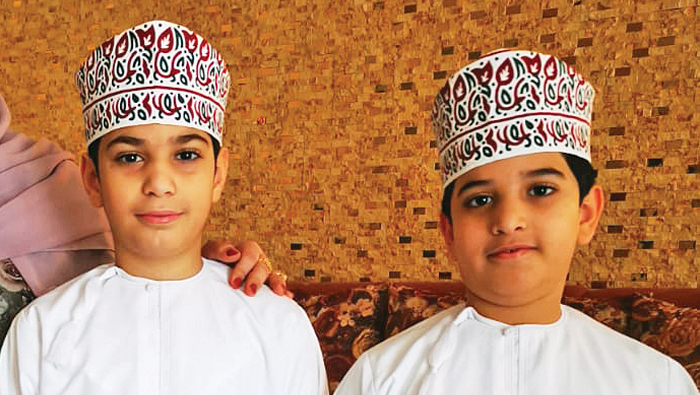

Musact: A man who lost his wife as well as his newborn twins to COVID-19 shares the pain and sadness that he felt at their passing away.
39-year-old Aida, who was suffering from coronavirus, gave birth to a boy and a girl, who passed away just two hours after they were born, because they had contracted COVID-19 from her.
Their mother succumbed to her illness at 4 am, a further two hours after her newborn children departed this world. Aida had been trying to give birth for more than seven years.
Now, her husband, Hassan Al Hashmi, has come forward to share the tragic tale of their passing, and has requested the Ministry of Health to do more for mothers with high-risk pregnancies during these tough times.
“My wife was pregnant with twins, had previously suffered a stroke, and had gestational diabetes,” said Hassan, speaking to the Times of Oman. “She was a candidate for high-risk pregnancy. However, when she went for a routine consultation for the health of her babies, there was no consideration given to her condition.”
Aida had an appointment with her gynaecologist at Wattayah Health Centre on June 2, 2021. It is believed that she might have contracted COVID-19 during her outside visit.
“A week before that appointment, she was at home, and I was with her,” recalled Hassan, who works in the desert regions of the country, but whose family lives in Wilayat Seeb.
“Had she been infected before, I would have contracted it as well, as would our other two children, but they only developed the infection after her visit outside.”
“I went back to work on the same day, and had to do a COVID test before going to my place of work,” he added. “This is part of our company policy, and this is how I know I was also not infected.”
Four days after her appointment, Aida began to develop symptoms as her disease intensified.
When she went to the health centre near her house, despite reportedly waiting for a doctor for more than an hour and explaining her condition, she was told to go to the COVID-19 ward, with no consideration allegedly given for her current state of health.
Despite having a high-risk pregnancy, her husband said she was not admitted, but told to come the next day to make an appointment, when she would be examined.
On June 12, Aida took a turn for the worse: her cough increased dramatically, prompting her brother to rush her to Royal Hospital, where she was given water, steam, and oxygen to relieve the coughing.
Hospital staff conducted blood tests, and asked her to go to Khoula Hospital, where all her medical references lay. Further x-rays and blood tests conducted showed she had contracted infections in her blood, urine, and chest. She was given medicine to counter these issues, and subsequently reported no difficulty breathing during her first two days of admission.
On the third, however, her oxygen levels began to fall, requiring her to be moved into intensive care, which happened on her fifth day as an inpatient. She was taken for an x-ray, which revealed that the coronavirus had spread across her lungs. Doctors subsequently took the decision to put her under an anaesthesia and on a ventilator.
“I was talking to the obstetrician and gynaecologist about when my wife was likely to give birth, given her circumstances, and I was told they would wait for at least a week, in case her health deteriorated further,” recalled Hassan. “However, later that night, at 11:30 pm, the hospital contacted me again because it was an emergency.”
He was met with heart-breaking news when he arrived: his wife had given birth to twins, but they had died shortly afterwards, because of difficulties breathing. It was apparent then that they had contracted COVID from their mother.
With a heavy heart, a grief stricken Hassan prepared to bury his newborn children. Aida had quit her job in a private company to take care of the couple’s elder children, 10-year-old Yazan, and Adam, aged eight, and was so excited for the new arrivals that she had decided on their names – the girl was to be called Misk, and the boy, Noah – even before they had been born.
“After I finished the formalities, I took the twins myself, washed them at a cemetery, and buried them myself, at around 2:30 am,” said the heartbroken father. “After the burial, I went to check on my wife, hoping her conditions would have improved. However, she was still very critical, despite having given birth naturally with no complications.”
Hassan reached home at four in the morning: 50 minutes later, doctors from Khoula rang him up to say that at 4:15 am, his wife had died after her health had deteriorated further.
“I buried my children at 2:30 am, and at 4:15, my wife died,” revealed Hassan. “She was admitted to hospital on Saturday, and departed from there the next Saturday, a week later. After I buried my wife, I had to go and tell my other children – Yazan and Adam – the news of their mother’s passing. They did not know she was no longer in this world.”
Aida’s sister, Abeer, added that the bond between Aida and her children was very strong: when their mother was in hospital, they would anxiously ask her when she was coming home.
“They were crying all the time because they were unable to see their mother,” said Abeer, “They were used to sleeping only on their mother’s lap when they were little so it caused her great psychological distress when they could not visit her while she was in hospital. Her illness affected all of us.”
Although Aida did transmit the disease to her children, they developed only mild symptoms, and recovered from COVID-19 fairly quickly. The decision to move her to hospital was also taken with the aim of protecting her then-unborn babies from the effects of a lack of oxygen.
“When she realised she had difficulty breathing, she insisted on being admitted to hospital soon, so that their birth would not be affected,” added Abeer, who was devastated when she heard of her sister’s passing.
“When I heard the news of the twins’ death, it was very saddening for all of us. For their sake, I was insistent on going to the hospital to take care of them. I thought about how my sister would react, on waking up from her anaesthesia that her newborn babies had died.”
“About two hours after I heard of the death of the twins, the hospital informed me that my beloved sister had passed away as well,” she added.
“I just collapsed from the tragic news – I had not expected this at all. After all, my sister’s symptoms were very simple at the beginning – she had only come to the hospital to provide for her children by giving them oxygen.”
Back home, a tearful Hassan broke the news of his wife’s death to his sons.
“I told them that when we die, we go to heaven,” he admitted. “My sons know that heaven is better than this life, and after talking to them about heaven and death for some time, told them that their mother was now in heaven. The news was understandably extremely shocking to them.
“They cried after they heard of her death, and since then have been crying every night, asking for her. I pray to the Almighty to make this painful period easy for them, and to give us the strength and patience to handle her demise.”
So that other women in Aida’s condition receive speedy medical treatment when they need it, Hassan Al Hasmi has requested the Ministry of Health to assign priority healthcare to those with high-risk pregnancies.
“My wife was found to have many infections when tests were done on her after she was admitted to Khoula Hospital,” he said.
“If the health centre she had first gone to had admitted her and provided her care, her infections would not have worsened. She was found to have infections in several organs…this weakened her immunity and significantly sped up the spread of the virus in her lungs.”